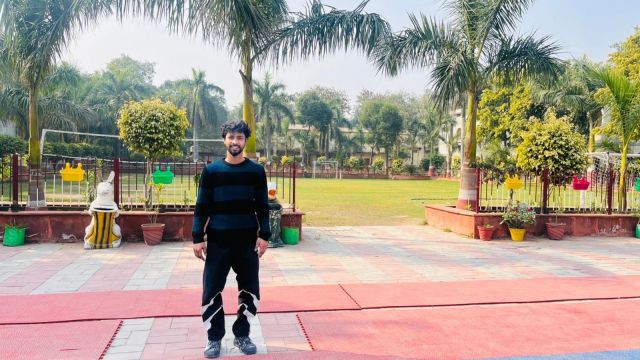These Delhi govt school grads are now success stories. Here’s what worked for them — and what didn’t
In the run-up to the Delhi Assembly polls, the AAP has pitched its education schemes and the overall transformation of government schools to bring them at par with private institutes as its major achievements. The Indian Express speaks to former students about what helped them in school and what they think can be improved upon
 Vijay Kumar, 22, standing in the basketball court of Paschim Vihar’s Government Co-ed Senior Secondary School, where he studied from Class 6 to 9. (Vidheesha Kuntamalla)
Vijay Kumar, 22, standing in the basketball court of Paschim Vihar’s Government Co-ed Senior Secondary School, where he studied from Class 6 to 9. (Vidheesha Kuntamalla)The desks may be the same but a lot has changed since 2016 at Paschim Vihar’s Government Co-ed Senior Secondary School, where Vijay Kumar studied till Class IX. From a 14-year-old gangly student at a Delhi government-run school, he went on to graduate in chemical engineering from IIT-Delhi in 2022 and co-founded a hospitality start-up.
For someone who defied the odds stacked against him, a visit to his alma mater left the 22-year-old stunned. Pointing to the newly relaid outdoor basketball court and the football field — “with real grass” — he remarks in awe, “The difference is unimaginable. Everything has been beautified here. The playground was a barren patch of land when I was a student here till 2016.”
Pointing to the newly built classrooms and other infrastructure upgrades on the premises, Vijay says, “When I was in Class XII, my juniors studied under tin-roof sheds because the old building was being reconstructed.”
 Vijay standing in his old classroom. He graduated in chemical engineering from IIT-Delhi in 2022.
Vijay standing in his old classroom. He graduated in chemical engineering from IIT-Delhi in 2022.
In his old classroom on the first floor, more pleasant surprises await. “The desks are the same, but the broken windows and fans have been fixed. The board used to be black when I was here. It’s green now,” he says, adding that he moved to the nearby Rajkiya Pratibha Vikas Vidyalaya (RPVV), also a Delhi government-run school in Paschim Vihar, after Class IX and studied there till Class XII.
Vijay was among 4,953 students from Delhi government schools who enrolled for scholarships in 2018 to join IIT-JEE coaching centres under the Jai Bhim Mukhyamantri Pratibha Vikas Yojana. Under the scheme, launched in 2017, assistance up to Rs 40,000, along with a Rs 2,500 monthly stipend, is provided to students whose family income is below Rs 6 lakh a year. The students are then enrolled in empanelled coaching institutes for competitive exams such as NEET, JEE-Advanced and CAT. According to an official statement, in 2018-19, 35 of 107 students enrolled under the scheme cracked JEE-Advanced and NEET.
In the run-up to the Delhi Assembly polls, it is schemes like these and the overall transformation of government schools to bring them at par with private institutes that AAP has pitched as its major achievements.
 Vijay with his Social Science teacher Saabir Hussain at Rajkiya Pratibha Vikas Vidyalaya (RPVV), also a Delhi government-run school where he studied from Class 9 to 12.
Vijay with his Social Science teacher Saabir Hussain at Rajkiya Pratibha Vikas Vidyalaya (RPVV), also a Delhi government-run school where he studied from Class 9 to 12.
Under former Deputy Chief Minister Manish Sisodia, who also held the education portfolio, the government introduced several key initiatives like the Happiness Curriculum “to promote emotional well-being”, the Deshbhakti Curriculum “to instill civic values” and the Entrepreneurship Mindset Curriculum “to foster business acumen”. It also introduced the Schools of Specialised Excellence (SOSE), which provided focused education in STEM (science, technology, engineering, and mathematics), humanities, and arts.
Since 2015, the AAP government has allocated nearly 25% of its annual budget towards education reforms. In 2024-25, out of the Rs 76,000 crore, a budget of Rs 16,396 crore was proposed for the education sector. However, rivals Bharatiya Janata Party (BJP) and the Congress have criticised the AAP government for “not building new schools, only new classrooms”.
Despite significant progress in infrastructure and academic outcomes, government schools still struggle with shortcomings in areas like extracurricular activities — debates and sports — competitive exam preparation for higher education and cleanliness.
This was pointed out by students like Vijay.
 K M Sandhya, 20, a second-year student at Maulana Azad Medical College, transferred to the Delhi government’s Sarvodaya Kanya Vidyalaya (SKV) in Yamuna Vihar from a private school after Class VIII.
K M Sandhya, 20, a second-year student at Maulana Azad Medical College, transferred to the Delhi government’s Sarvodaya Kanya Vidyalaya (SKV) in Yamuna Vihar from a private school after Class VIII.
For him, the biggest gap was his struggle to communicate in English. “When I entered IIT-Delhi, I was hesitant to ask questions in English. No one that I knew at a government school spoke English. I belong to a modest background — my father is a tailor and my mother is a homemaker. So private schooling, where English is commonly spoken, was never an option.”
At the RPVV too, the curriculum then did not place a huge importance on communication skills. He says with some self-discipline, private coaching and an unwavering determination to succeed, he overcame the issues he faced while communicating in English by watching English series on OTT platforms.
Today, the RPVV in Paschim Vihar is a School of Specialised Excellence (SOSE), whose new building was inaugurated last year. As Vijay steps into the SOSE campus, he spots his old Social Science teacher, Saabir Husain, 57, who has been teaching at the school since 2003.
 Deepanshu, 20, another student at Maulana Azad Medical College, was educated entirely in Delhi government schools. He secured a NEET rank of 514 without private coaching.
Deepanshu, 20, another student at Maulana Azad Medical College, was educated entirely in Delhi government schools. He secured a NEET rank of 514 without private coaching.
Smiling warmly as Vijay touches his feet, Husain says, “Students like Vijay are proof of RPVVs producing achievers. Though we still do not know the academic outcome of the SOSE batches, we will find out how these students performed academically this year (the first batch will pass out in 2025).”
Vijay chimes in, “I could not afford private schooling, but RPVV gave me the foundation I needed. However, competitive exam preparation wasn’t emphasised enough by the school. I had to rely on separate coaching classes to clear JEE.”
Husain adds, “The infrastructure is great, but the SOSE curriculum has been a little confusing. Teachers haven’t been told properly what outcomes are expected from the students. While initiatives like the Happiness and Deshbhakti Curriculum are good steps, they sometimes divert students from the core syllabus.”
Students like Vijay also thought that sports were not prioritised in government schools. He loved playing kho kho but there was no proper training or proper coaches, he says.
Vijay also thinks more consistent parent-teacher engagement could improve the education system. “Parent-teacher meetings rarely happened — maybe once in six months or a year. Regular meetings are important. How else will parents know how their children are doing?” he says.
Across the city, other “success stories” from Delhi government schools weigh in on what worked and what didn’t work for them.
K M Sandhya, 20, a second-year student at Delhi’s Maulana Azad Medical College, recalls her initial apprehensions about joining a government school. She transferred to the Delhi government’s Sarvodaya Kanya Vidyalaya (SKV) in Yamuna Vihar from a private school in the area after Class VIII.
Sandhya lives in Northeast Delhi’s Maujpur, which is a mix of unauthorised colonies and jhuggi jhopdi (JJ) clusters; her father is a contractual employee in the Municipal Corporation of Delhi’s House Tax Department and her mother is a housewife.
“Before I joined the government school, I had a very different impression of them. However, my school was a good one. The teachers and the infrastructure were decent, with good classrooms and desks,” Sandhya says.
She passed out of school in 2022, having scored 98.2% in her Class X board exams and 95.2% in her Class XII board exams.
Despite her positive experience and academic performance, she realised in college that the curriculum had “critical gaps”. Stating that she went on to succeed despite the “systemic shortcomings”, she says, “Delhi government schools should emphasise teaching communication skills. I understood this only after I went to college — government school students feel a little underconfident. Students who come from private schools speak in English more comfortably.”
She discovered her “other disadvantage” when she took coaching from a private centre. “Government schools are more focused on board exams. They do not offer enough support to students when it comes to competitive exams. Board exam results don’t really matter — to get into a good college, one needs to ace competitive exams,” she says.
She also mentions overcrowded classrooms, another issue mentioned by several others. “There was no space in my school,” she says, adding that each classroom then had at least 78-90 students.
As of today, SKV Yamuna Vihar accommodates over 4,500 students, as per official data provided on the Delhi Education Department’s website.
While Sandhya praises the career counseling services offered at her school, she says government schools often lack concept-based education and interactive learning opportunities. “More debates and interactive programmes must be organised in schools and classrooms to keep students from feeling overwhelmed when they go to college,” she says.
Her observations are echoed by others, including Deepanshu, 20, another student at Maulana Azad Medical College. A resident of Sultanpuri in Northwest Delhi, Deepanshu’s parents run a tea stall. Entirely educated in Delhi government schools, he secured a NEET rank of 514 without private coaching.
A student at Nagar Nigam Vidyalaya, Sarvodaya Bal Vidyalaya, and RPVV in Sultanpuri, he says, “In primary school, I felt teachers were not patient enough and not as accessible. In middle school, I felt that some of them were very lazy. Kuch teachers time pass karne aate the school (Some teachers used to come to school just to pass the time).”
Deepanshu feels regular monitoring could improve teaching quality and ensure better accountability among teachers. “When we had a good principal who used to come for regular inspection, the teachers would remain alert,” he says.
Recalling a time when he was in Class VII at Sarvodaya Bal Vidyalaya in 2017, he says his classes were conducted in a temporary tin shed.
“My school building was in a bad condition and needed to be reconstructed. By the time it was built, I had passed out of school. We also lacked clean bathrooms,” Deepanshu says.
Calling RPVV, where he studied in Classes 11 and 12 (2021-2022), the “best school” he attended, he says, “RPVV is the best school I have been to in my life. It has now become a SOSE. I had a very good counselor who supported me. It also had specialised communication improvement and morale-boosting lectures.”
Despite all the support, Deepanshu’s journey to clearing NEET was largely self-dependent. “Learning from YouTube is how I cleared my NEET examination. Our school also had coaching classes for a month, which helped a lot,” he says.
However, he believes the government’s focus should shift. “Instead of developing a good school like RPVV into a SOSE, the Sarvodaya Vidyalayas and the co-ed schools which still need more development, should be made better and turned into SOSEs. Those are the schools that need more attention,” he says.







